Ariel Ministries Messianic Collection (11 vols.)
Digital Logos Edition
Overview
The Ariel Ministries Messianic Collection brings together the works of Dr. Arnold Fruchtenbaum, founder of Ariel Ministries and widely-regarded as one of the foremost Bible scholars of his time with his emphasis on the Jewish character of the Scriptures. Each of these 11 titles demonstrates his exceptional level of scholarship and readability while covering a large spectrum of theological, spiritual, and practical themes. Both Jewish and non-Jewish believers alike will marvel at these ground-breaking perspectives on the Bible, Jewish traditions, and Israel. This series will transform your study, practice and teaching.
Of special note among the titles included is a Messianic Bible Study Collection that features 190 classic studies. This collection contains hundreds and hundreds of pages of in-depth passage and subject explorations from the Bible. Dr. Fruchtenbaum’s clear and penetrating thought leads you to consider these matters in a new, revealing light, bringing the truth of the Word of God to the fore.

- Covers a large spectrum of theological, spiritual, and practical themes
- Ground-breaking perspectives on the Bible, Jewish traditions, and Israel
- Title: Ariel Ministries Messianic Collection
- Author: Arnold Fruchtenbaum
- Publisher: Ariel Ministries
- Volumes: 11
This title is included in the following collections
You can save when you purchase this product as part of a collection.
2025 Messianic Jewish Silver
$349.99$279.99Logos 9 Messianic Jewish Silve...
$349.99$349.992025 Messianic Jewish Gold
$849.99$679.99Logos 8 Messianic Jewish Gold ...
$849.99$849.99
- $849.99
- $1,499.99$1,199.99
- $1,499.99
- $1,499.99
- $2,999.99$2,249.99
- $2,999.99
- $2,999.99
- $4,749.99$3,562.49
- $23,999.99$17,999.99
- $24,999.99
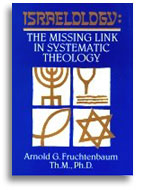
One's view of Israel is key in determining one's theology. This groundbreaking study investigates four approaches to the theology of Israel past, present and future; and scrutinizes beliefs that tend to confuse the identities of both Israel and the Church. Amazingly, this ground breaking work is the first to create an entire systematic theology of all that the Scriptures say in regard to the people of Israel. As such, Israelology fills a tremendously neglected void, while affecting nearly every other segment of systematic theology and directly addressing a crucial point of division in evangelical theology today.
Dr. Fruchtenbaum’s masterful book, written over a 13-year period to earn his Ph.D. from New York University, exhaustively surveys every aspect of Israel from the perspective of four major schools of theology (postmillennialism, amillennialism, premillennialism and dispensationalism). Its far-reaching conclusion is that only the last, with its clear distinction between Israel and the Church, can, in fact, provide a systematized biblical doctrine of Israel. But even dispensationalists – while organizing every other major Scriptural theme from the Church (Ecclesiology) to Salvation (Soteriology) to Last Days (Eschatology) – have failed to develop a systematic theology of one of the Bible’s most integral subjects, Israel. Until now.
Israelology pioneers a fully dispensational approach to this topic, proving that it is central to a proper systematic theology and, thus, critical in terms of issues such as Messiah’s return, evangelism, anti-Semitism and, ultimately, God’s entire agenda for Jews and Gentiles alike.
…tremendous, masterful book... Amillennialism, postmillennialism and other forms of Covenant Theology go up in smoke under the withering blaze of biblical light Fruchtenbaum places on them.
—The Biblical Evangelist
This book is a ‘must have,’ ‘must read,’ and ‘must reference.
—Journal of the Grace Evangelical Society
This book is doubtless the most thorough work on the relationship of Israelology to systematic theology.
—Bibliotheca Sacra
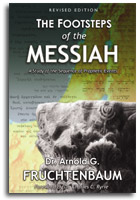
Using the Book of Revelation as an end time road map, Dr. Fruchtenbaum weaves the prophetic writings of the Hebrew Scriptures and Messiah’s teachings to reveal God’s plan for the future of Israel and the world. Dr. Fruchtenbaum gathers the many pieces of the prophetic puzzle and places them in sequential order with the result summed up by Dr. Charles Ryrie in his foreword: "Those who read this book cannot help but be instructed and stimulated by his work."
Footsteps is detailed, thorough and scholarly, yet written in a style that the average reader can easily understand. With a wealth of wisdom drawn from his Jewish background and extensive research, the author even tackles the "problem passages" to provide a comprehensive overview of the entire range of prophetic truth.
Twenty years of teaching Eschatology since the original writing of this book has given Dr. Fruchtenbaum further reflections on some passages. This updated edition includes five new appendices to the book.
In a thoroughly biblical, balanced, and clear presentation, Arnold Fruchtenbaum plainly lays out God’s plan for the future while avoiding the sensational errors of other prophetic writers. I have relied on this book as a resource for years.
—Michael Rydelnik, Professor of Jewish Studies Program, Moody Bible Institute
… the finest summation of the overall future development of world events as set forth in the entire Word of God…
—Dr. James O. Combs, Provost, Louisiana Baptist University
This clearly written study focuses attention on a vast number of prophetic texts in the Word of God. Therefore even those who may differ with the author on the sequence of some of the details will profit from a careful study of this book.
—Bibliotheca Sacra
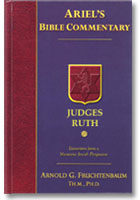
Judges and Ruth: The Second Installment of Ariel’s Bible Commentary Series
- Author: Arnold Fruchtenbaum
- Publisher: Ariel Ministries Press
- Publication Date: 2006
- Pages: 478
The spiritual condition of God’s chosen people during the period of the Judges is summarized by the final verse of the book. “In those days there was no king in Israel; everyone did what was right in his own eyes.” – Judges 21:25. Israel’s repetitive cycles of sin, slavery and submission to the gentile peoples in and around the promised land, repentant submission to God, and finally salvation by God’s work through the judges He raised up as deliverers provides the story line in the national incubator prior to the United Kingdom of Saul, David and Solomon.
The characters of this exciting time provide the body of Messiah with illustrations pointing to God intervening in the lives of His people when they call upon Him. The story of Ruth is a foreshadowing of the Lord’s redemptive plan for all peoples – Jew and Gentile alike.
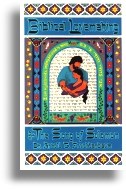
Biblical Lovemaking is a sensitive, literal study of The Song of Solomon, the Old Testament book of the Bible that tells the story of the courtship, wedding and subsequent sexual adjustments between Solomon and his wife, Shulamit. From this very real story written in poetic form comes many principles from a biblical perspective on the subjects of courtship, marriage, and sex, as well as many practical suggestions on how to enjoy your mate.
Dr. Fruchtenbaum manages a wonderful, verse-by-verse exposition of the biblical passages without offending or boring his readers. The "Summary" and "Application" sections are extremely insightful. With practical suggestions to make marital relationships more fulfilling, this book is for any man or woman who desires to understand the Scriptures' healthy standards for courtship, marriage and sex.
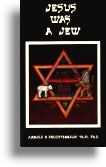
In this small but mighty book, the author comes to grips with basic issues in theology, such as why Jesus died and why Jewish people object to Him. This rabbinic interpretation presents passage after biblical passage relating the Old Covenant's fulfillment in the Messiah. For two decades, Jesus Was a Jew has proven itself an incredibly powerful witnessing tool to Jewish people, and it is ideal for Jewish friends who are skeptical of your faith, but willing to read.
Who was Jesus of Nazareth? Controversy over the answer still rages today. Was he a good teacher? Was he a well-meaning, but confused, religionist? Was he a disciple of another teacher?
Regardless of your answer, Jesus was a Jew.
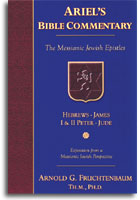
Years of meticulous study, writing, and editing have produced this remarkable commentary on the Messianic Jewish Epistles (MJE) covering the books of Hebrews, James, I Peter, II Peter, and Jude. The first installment of the Ariel Commentary Series highlights the real life concerns of 1st century Jewish believers. This important book deals with the issues Jewish believers wrestled with during the turbulent early years of the Church. While things in these epistles are applicable to all believers, some are true only of Jewish believers.
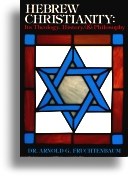
This down-to-earth book deals with the many thorny realities facing every Jewish believer. It addresses a wide range of the practical and theological issues that arise when a Jewish person accepts Jesus as Messiah and seeks membership and fellowship in a local church, yet rightly desires to maintain lifelong community and national identities. The book is broad in scope and cites the major themes of Hebrew Christianity today. It’s also careful in detail, wrestling with controversial matters raging within and without the messianic movement.
This is a book about the Jews who have found favor with God by receiving Jesus as Messiah. Written by a Hebrew Christian for Jew and Gentile alike, here is an articulate survey of the biblical position of the Hebrew Christian’s distinctiveness, his relationship to the Jews, the Law of Moses, the local church, the State of Israel, missions and many other timely topics. An overview of the Hebrew Christian’s role in history from Paul to the Jewish believers of today brings new perspective. It also brings the realization that for the first time since the writing of Romans, rabbis are considering the Hebrew Christian movement a threat. Here is the inside track on that threat. This is what is happening in the lives of Hebrew Christians and how they are relating their faith to the rest of the world.
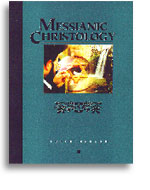
Messianic Christology is a study of Old Testament prophecy concerning the First Coming of the Messiah. Dr. Fruchtenbaum works his way through the Old Testament following the first century Jewish arrangement of the books, the arrangement that Jesus was familiar with. He shows how the revelation of the Messiah gradually progressed and built-up to reveal a magnificent picture of the Deliverer to come; from The Law, The Prophets and The Writings.
The Hebrew Scriptures formed the very basis for evangelism in the New Testament. First, Jesus with His disciples, and then the disciples themselves used the Old Testament to substantiate His claim to be the Messiah. When the messianic expectations of Hebrew prophecy are fully understood, it becomes clear that Jesus and only Jesus can fulfill these requirements.
An entire supplemental section explains how the Old Testament reveals not only the plurality, but also the unity and triunity of the Godhead. Eleven in-depth appendices cover critical topics including: The Sons of God of Genesis 6, Rabbinic Views of Messiah and Isaiah 53, Why Did Messiah Have to Die?, Christ's Right to David's Throne, The Starting Point of the Seventy Sevens, How Did the Wise Men Know?, How the New Testament Quotes the Old Testament, The Death of Judas Iscariot, Jewish Objections to Jesus, and a detailed Table of Messianic Prophecies.
Messianic Christology is an absorbing study that will strengthen your faith, bless your heart, invigorate your worship, and empower your witness to Jew and Gentile.
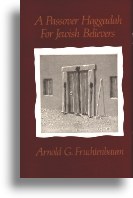
This book is as important for Gentile believers as Jewish ones. Any believer in Jesus who has partaken of "communion" will find the Jewish background of that sacrament not only fascinating and edifying, but a tremendous way to share one's faith as well. A Passover Haggadah for Jewish Believers gives a step-by-step explanation of the Jewish Passover Seder, interspersed with New Testament passages that pull together all the biblical references to the "Last Supper."
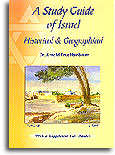
This comprehensive reference guide will illuminate your understanding of the Old Testament and the gospels through examining virtually every place in Israel in relation to biblical events and themes and studying Jewish history, especially the history of the State of Israel. This study guide is an excellent traveling companion on all Israel tours as well as an essential resource for any believer's ongoing study. The book contains a treatment of Jordan’s important sites, as well. Both sections include ample scriptural references.
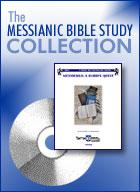
The Messianic Bible Study Collection assembles 190 of Dr. Fruchtenbaum’s in-depth studies on the Scriptures. This extensive collection showcases the author’s expert knowledge of Hebrew, Greek, the Talmud, the history of the Jews, the geography of Eretz Israel, a scholar's command of The Word—and the inspiration of the Ruach HaKodesh. Each study is a solid foundation upon which you can stand—a whiteboard from which you can teach—or a podium from which you can preach the uncompromised truth to your congregation. You'll be impressed and eternally blessed by the laser-like precision of Dr. Fruchtenbaum's anointed exegesis.
Studies Include
(NOTE: This is only a selection of the 190 studies included in this collection)
The Ten Plagues
A detailed study of the ten plagues and how they affected the various Egyptian gods.
The Tabernacle in Exodus
The basic significance of the Tabernacle and its typology.
The Feasts of Israel
This is a survey of all seven holy seasons of Leviticus 23 and each one is dealt with in five areas: scriptures, names, biblical practice, rabbinic/Jewish practice, and the Messianic significance.
The Fall of Man: Genesis 3:1-24
A study of the creation, temptation, and fall of man.
Blessings and Cursings: The Outworking of the Mosaic Covenant in Leviticus
A detailed study of chapter 26 in the book of Leviticus, most of which has already been fulfilled, yet the blessing aspect has yet to find fulfillment.
The Levitical Offerings and/or the Levitical Sacrifices
A survey of the five Levitical offerings.
The Day of Atonement in Leviticus 16
This study deals with the Day of Atonement as described in Leviticus 16.
Psalms 90: An Exposition
An exposition of Psalm 90 from the framework of the experience of Moses at Kadesh Barnea.
The Seven Days of Creation: Genesis 1:1-2:3
A detailed study on the first seven days of creation from the Genesis account.
The Creation of Adam and Eve: Genesis 2:4-25
A study of the creation of Adam and the subsequent creation and need for the creation of Eve.
The Fall of Man: Genesis 3:1-24
This study details the account of the fall of Adam and the results of that fall.
The Suffering Messiah of Isaiah 53
A study of the most detailed Messianic prophecy in the Old Testament.
The Call of Isaiah
How Isaiah was called into prophetic office.
The Reign of Immanuel
A study of the rule in the Messianic Kingdom as portrayed by Isaiah the prophet.
The Little Apocalypse of Isaiah
A study of Isaiah 24-27 and how it correlates with the Book of Revelation.
The Servant of Jehovah
Isaiah's favorite name for the Messiah was "The Servant of Jehovah" and this deals with those prophecies of Isaiah.
The Seventy Sevens of Daniel
A detailed study of the seventy sevens of Daniel and what part was fulfilled by the First Coming and what waits to be fulfilled.
The Call of Jeremiah
A study of God's call of Jeremiah to be a prophet.
The Ten Symbolic Actions of Jeremiah the Prophet
God often asked His prophets to perform ceremonies to teach us lessons and these are ten symbolic actions God asked Jeremiah to perform.
The Book of Consolation: Jeremiah 30-33
While Jeremiah's book tends to be primarily negative toward Israel, these are four chapters in which he prophesied along more positive lines.
The Call of Ezekiel: Ezekiel 1:1-3:21
A detailed study of how Ezekiel was called to be a prophet in spite of his reluctance.
The Symbolic Actions of Ezekiel the Prophet: Ezekiel 4:1-5:17
God often asked his prophets to do symbolic actions and this study examines the symbolic actions that Ezekiel was asked to perform.
The Departure and Return of the Shechinah Glory According to Ezekiel the Prophet
A study of the main theme of the book of Ezekiel dealing with the departure and return of the Shechinah Glory.
Israel, the Unfaithful Wife: Ezekiel 16
This study examines the allegory that portrays the relationship of Jehovah as the husband to Israel as the wife of Jehovah.
The Fall of Satan According to Ezekiel 28:11-19
This study teaches on the fall of Satan as found in the verses dealing with the king of Tyre.
The Valley of the Dry Bones: Ezekiel 37:1-14
A study of Ezekiel's vision and how it portrays Israel's final regathering as a saved nation back in the land.
The Sign of the Two Sticks: Ezekiel 37:15-28
This study builds upon a previous study and shows Israel as a united nation never to be divided again.
The Message of Hosea’s Marriage
This study examines the marriage of Hosea and how it applies to God's relationship to Israel, the wife of Jehovah.
The Book of Joel
A verse by verse exegesis of the book of Joel.
The Book of Jonah
A verse by verse exposition of the book of Jonah.
The Book of Obadiah
A verse by verse exposition of the book of Obadiah.
The Book of Habakkuk
A verse by verse exegesis of the book of Habakkuk.
The Book of Haggai
A verse by verse exegesis of the book of Haggai.
The True Shepherd of Zechariah: A Study of Zechariah 11:1-7
A detailed study on one of the key Messianic prophecies about the First Coming.
The Little Apocalypse of Zechariah
A study of Zechariah 12-14 and how it correlates with the Book of Revelation.
The Book of Malachi
A verse by verse exegesis of the book of Malachi.
Nicodemus, a Rabbi’s Quest
A study of the confrontation between Jesus and Nicodemus. Explains how certain terms like being "born again" have a specific Jewish background.
The Seven Churches of Revelation
A survey of Revelation chapters 2 & 3 and what it teaches about the seven churches and their relevance through history.
The Upper Room Discourse
A study of the principles of the Law of the Messiah as Jesus began the transition from law to grace.
The High Priestly Prayer of Jesus
A study of the special prayer of Jesus in John 17 and the three categories of people He prayed for.
The Four Women of Revelation
A study of the four women in the book of Revelation: Jezebel; the woman clad with the sun, moon, and stars; the Great Harlot; and the Bride of the Messiah.
The Book of Galatians
A verse by verse exposition of the Book of Galatians.
The Book of James
A verse by verse exegesis of the book of James.
The Book of I Peter
A verse by verse exegesis of the book of I Peter.
The Book of II Peter
A verse by verse exegesis of the book of II Peter.
The Book of Jude
A verse by verse exegesis of the book of Jude.
The Five Warnings of the Book of Hebrews
This focuses specifically on the five warnings of the book of Hebrews and shows how they deal with physical judgment and not spiritual judgment.
The Introduction to the Book of Acts 1:1-26
This study contains teaching on the Ascension of the Messiah; the return of the Apostles to Jerusalem; and the choosing of the twelfth Apostle.
The Day of Pentecost and the Birth of the Church: Acts 2:1-47
A study of the birth of the Church and the witness of the Apostles on Shavuot/Pentecost at the Temple in Jerusalem.
The Witness of Peter and John and the Second Sermon of Peter: Acts 3:1-4:31
This study examines Peter and John's witness in Jerusalem.
The Story of Ananias and Sapphira: Acts 4:32-5:11
A study of the conduct of the early church community, both good and bad.
The Second Persecution of the Church: Acts 5:12-42
A study about apostolic authority and the persecution of the Apostles.
The Story of Stephen: Acts 6:1-8:4
A study on the witness of the first martyr of the Church.
The Story of Phillip: Acts 8:5-40
A study of Phillip an early deacon of the Church.
The Salvation of Saul, a Man of Tarsus: Act 9:1-31
A study of Saul's encounter on the road to Damascus and his salvation.
The Story of Cornelius: Acts 9:32-11:18
A study of the account of Peter's witness to Cornelius which resulted in the offering of the keys to the kingdom to Gentiles.
The Fourth Persecution of the Church of Jerusalem: Acts 12:1-25
A study of the persecution of the Church including the death of James and the imprisonment of Peter.
The First Missionary Journey of Paul: Acts 13:1-14:28
A study of Paul's missionary journey as it extends out to the uttermost parts of the earth.
The Jerusalem Council: Acts 15:1–35
A study of the First Jerusalem Council.
The Second Missionary Journey of Paul: Acts 15:36-18:22
A study of Paul's missionary journey between 48 and 52 AD.
The Third Missionary Journey of Paul: Acts 18:23—20:38
A study of Paul's missionary journey between 52 and 58 AD.
Paul’s Imprisonment in Jerusalem: Acts 21:1-23:35
A study of Paul's imprisonment in Jerusalem.
Paul’s Imprisonment in Caesarea: Acts 24:1-26:32
A study on Paul's imprisonment in Caesarea.
Paul’s Journey to Rome: Acts 27:1-28:31
This study deals with Paul's Journey to Rome and the years from 59 through 61 AD.
The Healing of the Man at the Pool of Bethesda: John 5
This study examines the healing of the man at the pool of Bethesda and how it supports Yeshua's messianic claims.
Jesus and the Samaritan Woman: John 4:1-42
A study of the encounter between Jesus and the Samaritan woman dealing with one's spiritual needs and thirst.
The Church at Antioch: Acts 11:19-30
A study of the witness of Saul and Barnabas to the church at Antioch.

One of the foremost authorities on the nation of Israel, Dr. Arnold G. Fruchtenbaum is a messianic believer and founder and director of Ariel Ministries – a Texas-based organization dedicated to evangelism and discipleship of Jewish people.
Dr. Fruchtenbaum was born in Siberia after his father was released from a communist prison there. Aided by the Israeli underground, the Fruchtenbaum family escaped from behind the Iron Curtain. While living in Germany from 1947 to 1951, Arnold received Orthodox training from his father – who had himself been reared to assume Chasidic (ultra-orthodox Jewish) leadership in Poland, only to later lose most of his family and his faith to the Holocaust. The Fruchtenbaums immigrated to New York, and five years later, at age 13, Arnold came to saving faith.
Before receiving his doctorate from New York University in 1989, Dr. Fruchtenbaum earned his Th. M. from Dallas Theological Seminary. His graduate work also includes studies at the Jewish Theological Seminary in New York City and the Hebrew University of Jerusalem. Having lived in Israel for three years, Dr. Fruchtenbaum’s intensive study of the role of that nation in God’s plan of world redemption has made him a much in-demand speaker at Bible conferences and schools throughout the world.
Reviews
24 ratings
Joel David Bright
9/17/2024

Ralph F. Elroy Jr.
3/11/2024
Having studied Dr. Fruchtenbaums 'Foodtsteps of the Messiah', consider myself blessed and better equipped to serve as the Lord leads. Very blessed. Thank you for this extremely insightful work.Charlie Orr
12/13/2023
Jim Jasmin
2/24/2023
I know ARNOLD very well a unique teacher! the best at what he does a wonderful human being, I have everything He's ever taught on and I suggest all to also get all that he has to offer there are know better teacher's out there.
Jean-Marie Dreyer
8/3/2019

DAVID PAHUKULA TAMALA
12/12/2017
best ever theology from jewish perspective and insights from the jewish cultureFrank Bush
7/11/2017
Great resource. Worth every penny. I have enjoyed Dr. Fruchtenbaum's work for years. Now having them in Logos makes the resources so much easier to use and reference. For me, five stars doesn't go high enough.